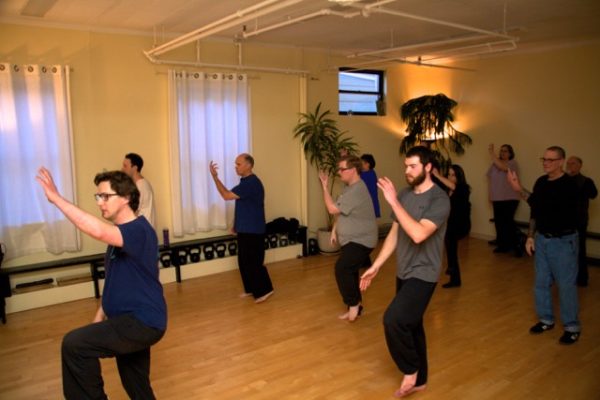If you’re looking for something to do that will make you feel stronger, more relaxed and less stressed, let me recommend Qigong. It’s pronounced Chee-gung and it’s an ancient Chinese form of movement.
Jason Ames, who is the founder and owner of the Maine Center for Taijiquan & Qigong in Portland, explained to me that Qi is a Chinese word that means life force energy — it’s also referred to as prana, vitality, and breath. The word gong means “to work or cultivate or develop,” he said. “So really, Qigong means to develop Qi, to develop life force energy or vitality — and it can take on many forms.”
According to the The National Qigong Association (NQA), “Qigong is an integration of physical postures, breathing techniques, and focused intentions. Qigong practices can be classified as martial, medical, or spiritual. All styles have three things in common: they all involve a posture, (whether moving or stationary), breathing techniques, and mental focus.”
Jason was introduced to Qigong and Tai Chi when he was in his early 20s. “It resonated with me as a way to empower myself particularly at a time I was coming out of tumultuous teenage years,” he said. “It became a powerful tool for me to find my own center and it was very helpful.”
Becoming an instructor is not something Jason intended to do, but that’s what he does now. Destiny, he called it. “My goal, class by class,” he said, “is to help people learn to transform their state into a more comfortable one or to achieve homeostasis in their body and their mind.”
Homeostasis is a state of balance or equilibrium. As Jason explained Qigong to me, I said it reminded me of Tai Chi and he told me that Qigong is the foundation for Tai Chi form. “It’s the starting point,” he said, “and it’s not necessary to learn a lot of complicated choreography and form, although you can move into that complexity.”
When you practice Qigong you learn how to calm your nervous system and focus your thoughts. You also learn how to regulate your breath and move your body, particularly to work on your range of motion. The ultimate goal is to develop your mind-body connection and achieve balance or homeostasis in all three areas.
The result: Less stress and more vitality. It can also help reduce chronic pain and strenghten the immune system. The NQA states that “Western scientific research confirms that Qigong reduces hypertension and the incidence of falling in the aged population. One of the more important long-term effects is that Qigong reestablishes the body/mind/soul connection.”
“You’re really working in some general way to build a bridge between mind and body,” said Jason. “You have patterns or habits in your mind, your thinking, your cognition, emotional patterns, etc,. and also a pattern in your movement and body. By developing and widening both of those aspects, you understand how each influences the other. It’s like a two-way road.”
Upcoming class
One of the places Jason teaches introductory Qigong is the Cancer Community Center in South Portland, Maine. His primary goal is give people an experience that changes something for them. “Even if they don’t understand the principles all that well, they may feel better after an hour,” he said. “They might feel relaxed and more calm and open. That tends to speak volumes more than anything I could say to them.”
Jason will present a free four-week introductory class called Principles of Qigong at the Cancer Community Center on the following Tuesdays: May 2, 9, 16, and 23 from 10:30 am to 11:30 am. The Cancer Community Center is at 778 Main Street, South Portland. Click here for more information or to register.



Leave A Comment